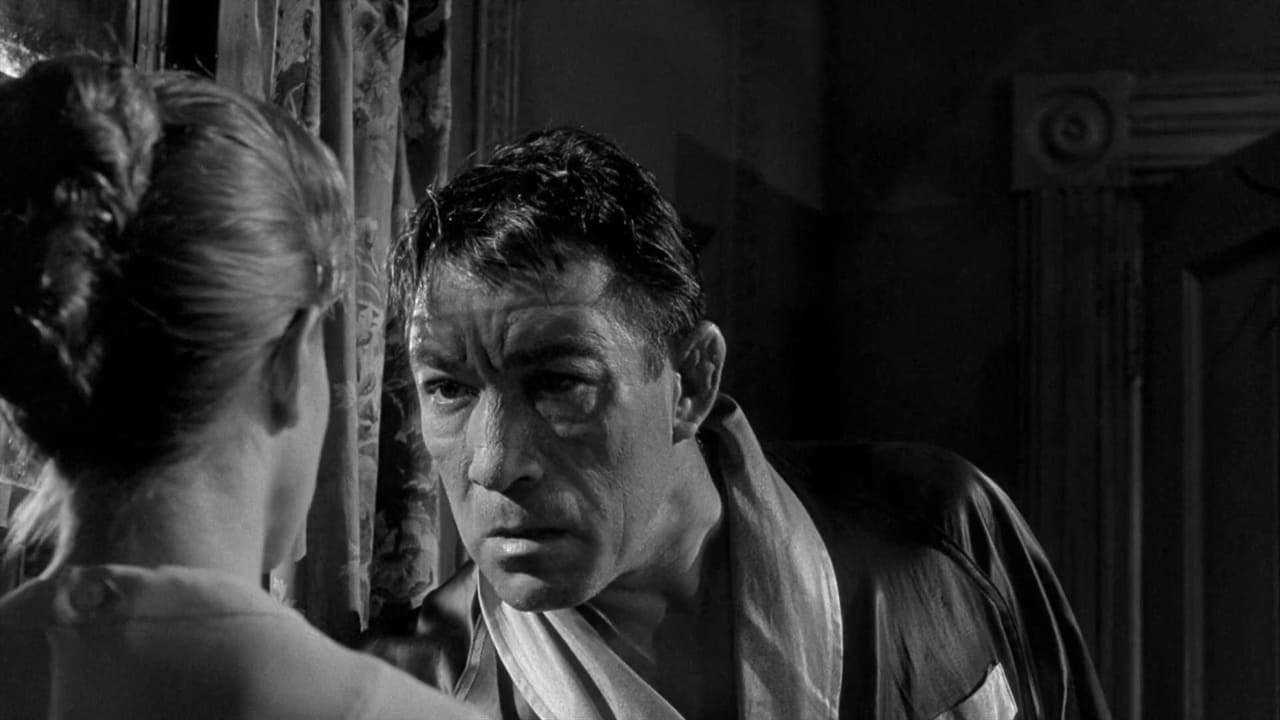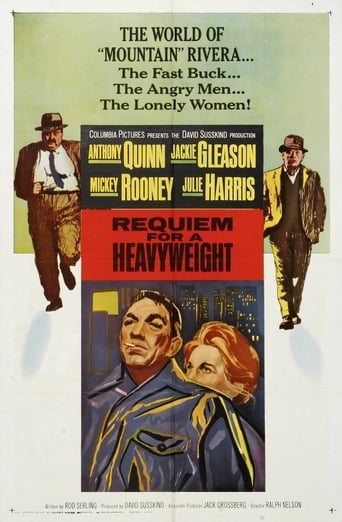

There were a lot of boxing films back when the fight ring was king. None however are better than this one. That's thanks to powerhouse acting and a first-rate script (Serling). Quinn's unforgettable as the damaged fighter, his face a mile of battered road, with a voice to match. Now he's at the end of that road. After all, even an athlete's body can only take so much. Trouble is he's the meal ticket for manager Maish (Gleason) who owes money big time to gangland thugs who will take him on a ride if he doesn't pay up. So maybe the desperate Maish can talk the slow thinker into prostituting himself as a phony wrestler. After all, doesn't Mountain owe him after their years together. At least that's what the exploitive Maish claims. Still, Mountain's got a chance at a decent job, thanks to employment counselor Miss Miller (Harris). So what will Maish do, and, more importantly, what will become of the ex-pug.What a fine cast. Gleason's Maish is not so much mean or evil as he is weak, that is, a manager willing to take advantage of his hapless charge. His dour expression and tight manner are about as far from the boisterous Ralph Kramden (The Honeymooners) as night is from day. Then too, Quinn's got the slow-thinking stammer down perfectly, projecting real pathos behind his lumbering hulk. Rooney's role as trainer-handler is more incidental, serving mainly as the trio's observer and conscience. And, of course, there's Broadway's distinguished Julie Harris as what amounts to the conventional world's Miss Miller. If there's a flaw in the film, I suspect it's with her not-very-clear interest in Mountain's life. But maybe the ambiguity is intentional, her limits being reached once Mountain makes a pass.That scene where a drunken Mountain goes to interview on a job Miss Miller has arranged is almost painful to watch. Maish has sabotaged Mountain's chances by getting him drunk. Worse, the interview's at a ritzy hotel, and loosing an inebriated lug there is almost like the fabled bull in a china shop. To me, the scene shows two worlds coming wrenchingly apart, dashing Mountain's best hopes. In fact, it looks like the movie is really about the three man family and how it also comes apart. Hard to think of a fight film being poignant, but this one is. It's salutes all around, even to the appropriately seedy sets. All in all, the results show that author Serling was as much at home in lower city precincts as he was in the upper zones of twilight.
... View MoreAged boxer Luis 'Mountain' Rivera (Anthony Quinn) is knock-outed by Cassius Clay. He is in bad shape and the doctor says he can't fight anymore. The bookie is after his manager Maish Rennick (Jackie Gleason) when Mountain lasted 7 rounds instead of 4. In addition to a $1500 bet, the bookie lost a bundle which he wants paid back. His trainer Army (Mickey Rooney) takes Mountain around trying to get a job. Social worker Grace Miller (Julie Harris) takes pity on the poor sap. Mountain has to swallow his pride and wrestle to save Maish's life. Anthony Quinn is amazing and so is Jackie Gleason. It is an unrelenting sad dark movie. It can also drag at times but the performances are so compelling.
... View MoreAfter seven grueling rounds with Muhammad Ali (as Cassius Clay), heavyweight boxer Anthony Quinn (as Louis "Mountain" Rivera) is knocked out. Told he with likely go blind if he fights again, due to optic nerve damage, Mr. Quinn must give up boxing. Displaying "punch drunk" behavior, Quinn is not exactly qualified to be anything other than a professional fighter. Pressured by gangsters, manager Jackie Gleason (as Maish Rennick) tries to get Quinn back in the ring, while trainer Mickey Rooney (as Army) encourages Quinn to try find another job. Thanks to kindly New York State employment worker Julie Harris (as Grace Miller), Quinn sets up an interview as summer camp counselor...The boxing profession takes another big hit, with this feature film version of writer Rod Serling's excellent 1956 "Playhouse 90" teleplay. Ironically, a couple of the profession's super-stars participate...This is essentially a four-person drama. All are re-cast from the original production, and all are outstanding. The "Film Daily" had Quinn finishing in the year's top five "Best Actor" performances, and Mr. Rooney was runner-up in the "Supporting Actor" category. Also award-worthy are Mr. Gleason and Ms. Harris. They are letter perfect in their supporting roles. TV director Ralph Nelson very successfully re-imagines the drama, enlarging the landscape while retaining intimacy. There is nothing new or original here, but that is only a minor deficiency. Interestingly, the "fight scenes" are memorable not for the fighting, but for the hideous spectators and the pathetic last impression of a boxer.******** Requiem for a Heavyweight (10/16/62) Ralph Nelson ~ Anthony Quinn, Jackie Gleason, Mickey Rooney, Julie Harris
... View MoreI don't think I had ever seen this movie from beginning to end before but had the chance to do so when it came up recently on a cable channel. One feels, after watching it in its entirety, as one does after having listened to Mahler's 9th symphony - you are emotionally drained and devastated. The movie is Exhibit A in the prosecution's case that movies were better made in the past than today. It is impossible to imagine something this excellent being produced today. The movie makes no plays for cuteness or humor, and never seeks to soften its razor-sharp edges. It is grittily real from beginning to end. Actually, it surpasses reality, as all great art does, in letting us look starkly into the cruel realities of human existence. The acting is absolutely top-notch from all the leads. One is reminded that Jackie Gleason, after all the eye-popping excesses of "The Honetmooners" (as great as that series was, for what it was) was a truly superb actor. I cannot think of a movie in which Anthony Quinn surpassed himself in his role as Mountain Rivera - tough, beaten up, beaten down, loyal, honest and yet with a sensitive core deep within. Mickey Rooney shines just as brightly. The script is brilliant, economical, realistic, and revelatory of the characters; we forget just what a brilliant writer Rod Serling was. Of course one of the reasons the movie could not be made today is that it forgoes the obligatory happy ending (which was used, evidently, in the TV version); the movie follows its dark logic all the way to the final, devastating scene.
... View More